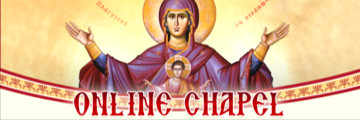![]() The Apostle John relates [Jn 19:30] that on the Cross, Jesus bowed his head and said it is finished.” St John Chrysostom points out that there is a small easily overlooked detail of great significance here. Jesus bows his head before he dies. Normally, one dies first and then the head bows without volition. St John notes that Jesus offers his life up in calmness and with intentionality. Then he dies. He dies willingly; voluntarily, with intention.[1]
The Apostle John relates [Jn 19:30] that on the Cross, Jesus bowed his head and said it is finished.” St John Chrysostom points out that there is a small easily overlooked detail of great significance here. Jesus bows his head before he dies. Normally, one dies first and then the head bows without volition. St John notes that Jesus offers his life up in calmness and with intentionality. Then he dies. He dies willingly; voluntarily, with intention.[1]
The verb, [tetelestai ] ordinarily carries the sense of “it has been accomplished or brought to completion.” A form of this same verb is used when Jesus tells the disciples. “Be perfect as your Father in heaven… [τέλειοι] [Mt 5:48] That is to say, ‘be completed’ or ‘reach the end for which you were created.’ The Apostles later come to understand, with the help of the Holy Spirit, what they didn’t grasp at that moment; that this means something on the order of ‘Bear fruit of human personhood by being in everlasting Communion with the Father, Son and Holy Spirit in and through Me.”
The creation of Man is not finished until there is a fully human and eternal glorifying of God; an action infused by the Holy Spirit, responding to God in an everlasting Eucharistic reciprocity. The truly human being in the Image and Likeness of God is one who is responding with total self-offering to the One who first offers Himself to us and all creation. This is inclusion. God is love.[I Jn 4:8] We are branches grafted on to the Vine of Christ.
Fr. Silviu Buntu points out that the medieval Slavonic and Romanian forefathers translated the word orthodoxy, as “right glorifying.” This is because Orthodox Christian faith is understood as not being mere belief about a historical fact or assent to dogmatic formulations, but as “being ascetical-mystagogical before it even receives any expressions, such as the liturgy.” The term “orthodox” is really an adjective rather than a noun, which he points out is why the Divine Liturgy “makes a clear and blunt claim that the forefathers, fathers, patriarchs and prophets–who were not “Orthodox Christians”–had our faith, were orthodox in another way.” [2] That is to say, they too were “right glorifying.”
This is also why prayer cannot be divorced from the whole way we live oriented toward this glorifying. It is not some sort of willfully contrived response that is designed to produce a result. Love does not respond to force of any kind. It answers the cry of a guileless heart. “Except ye come as a child ye cannot enter into the kingdom of heaven.” [Mt 18:3] Right glorifying of God issues from the whole person without artifice. Bowing our heads is an expression of laying our whole life down before Christ while holding nothing back.
Remember how Jesus told the disciples,“No one takes my life I give it.” [Jn 10:18] No one would have any power over him unless He permitted it – the abuse, the shaming, the beating, the slander, the mocking, the suffering, the rejection, and death itself.
All of us will bow our heads in death without fail. Whether we like it or, we will bow before the Creator iregardless of our attitudes toward Him while we have lived. Orthodox Christianity is the Way of voluntary, joyful, intentional bowing of our heads in and with Christ now, before God and one another, before we do so in death.
Our whole lives are a preparation for this encounter. It is immaturity and pride that resist and fear the vulnerability of self-offering. Pride bids us control the encounter and wants a guarantee of an ROI [return on investment]. Pride covers the shame that causes us to withold ourselves and turn our face away from the beloved. It is the source of all marital difficulties – the self-centeredness and seeking of self-protection, conscious and unconscious, that couples resort too with each other, instead of the vulnerability of self-offering. Most arguments consist of mechanical and automatic forms of reactivity and mindless remarks we make when we are tired, overworked and unrepentant. This is when our self-centeredness rises to the surface most easily.
St. Diadochus of Photike has some very helpful observations on how we are prepared in our lifetime, to overcome our pride and self-esteem in order to meet Christ in humility.
“Man cannot receive the seal of God’s holiness unless he is tested by labors and weaknesses. Humility is hard to acquire, and the deeper it is, the greater the struggle to gain it. In the case of one who has advanced halfway along the path of spiritual experience, self-will is humbled either by bodily weakness, or by people gratuitously hostile to [you] or by evil thoughts.
Today, however, since by the Lord’s grace peace prevails in the Church, the bodies of those contending for holiness have to be tested by frequent illnesses and their souls tried by evil thoughts. This is the case especially for those in whom divine knowledge is fully and consciously active so that they can be stripped of all self-esteem and conceit and can therefore receive in their hearts the seal of divine beauty through their great humility.”
Whoever loves God more than he loves himself, or rather no longer loves himself, but only God, no longer vindicates his own honor. Once a man has the full and active experience of the love of God so strongly that he has an inexpressible joy and love to leave his body and join the Lord, he does not become angry however much he is insulted or harmed, but remains united in love to the soul of the man who has insulted or harmed him.
When spiritual knowledge is active within us even to a limited degree, it makes us feel acute remorse if, because of a sudden irritation, we insult someone and make an enemy of him. It never stops prodding our conscience until, with full apology, we have restored in the person we have insulted, the feelings he had toward us before.”[3]
St Paul tell us that this is how Jesus himself lived. “He humbled himself and became obedient to the point of death.” [Phil 2:8 ] Humility is the path of union between God and man. Christ humbles himself in order to save us and waits for our response. Jesus was tempted by human abuse and jealousy, fears and physical trials. He was tempted by Satan, and tormented by the mistreatment of humankind, but he never resorted to punishing us or rendering evil for our evil against him. He remains in relationship with us as the presence of humility and loving compassion of God waiting to be discovered at the door of our hearts.
We are not Orthodox Christians because we believe Jesus existed historically or because we hold on to propositions or facts about him that we proclaim. We are Orthodox beause we live in relationship with Him in such a way that we glorify Him and seek to love one another through Him and to receive Him through one another and find Him everywhere in all places and filling all things. As He proclaimed, He is the Way. He is the Truth. He is the Life. Apart from Him we can do nothing, even if in our pride and naivite we imagine otherwise.
Our suffering, struggles and failures, have the potential to humble and awaken us to the real condition of our lives if we recognize Christ at the center. Contrary to what many in contemporary times would like to believe, we do not create ourselves. The Psalmist declares, “Know that the Lord is God. It is He that has made us and not we ourselves.” [Psalm 100:3] We are responders to the One who Creates us. “It is not the we love God, but that God first loved us” [I Jn 4:10] that sets everything in motion and provides for its completion. We seek to “tune” ourselves in response to the God who offers Himself for us in Christ as a continual embrace.
This Sunday we remember the noble Joseph of Arimathea and the myrrh-bearers bringing spices to anoint the dead body of Jesus out of their love as would be fitting and natural to do. They expect to find death, just as Martha and Mary expected Jesus to find the stench of death of their brother Lazarus who was four days in the tomb. But they are surprised to discover life instead. In an extraordinary surprise, Christ reveals to us that to die through total self-offering, is the path we take to live fully in God, who IS life and cannot be contained by death.
Every person will bring to completion the fruit of one human life. In our helplessness, we are offered up to God in death as an anaphora: ‘Thine own of Thine own, we offer unto Thee, in behalf of all and for the sake of all” as the priest does with the Lamb of the bloodless sacrifice, every Divine Liturgy. We are preparing the prosphora or our self-offering throughout our entire lives, at every moment, with every decision we make.
We are dust mingled with spittle, breathed into by God’s Spirit. We make our passage across the place of the ultimate loss and abandonment of everything, over the bridge of Christ’s own death offered for the sake of the world, “in behalf of all and for all.” There we wait in hope for his life to arise unencumbered by all that does not love and glorify God forever.
Next time you hear the priest intone “Let us bow our heads to the Lord” remember that Christ has first done this for us. Now is our chance to respond in joyful abandon to His love with our own self-offering in return.
_________________________________________
[1] Commentary on Gospel of John
[2] Meanings of our Life in Orthodox Liturgy, Bucharest, Romanian: Cherubim Press, 2022. pp 63-64
[3] Philokalia, Vol. I selections from # 91-95



